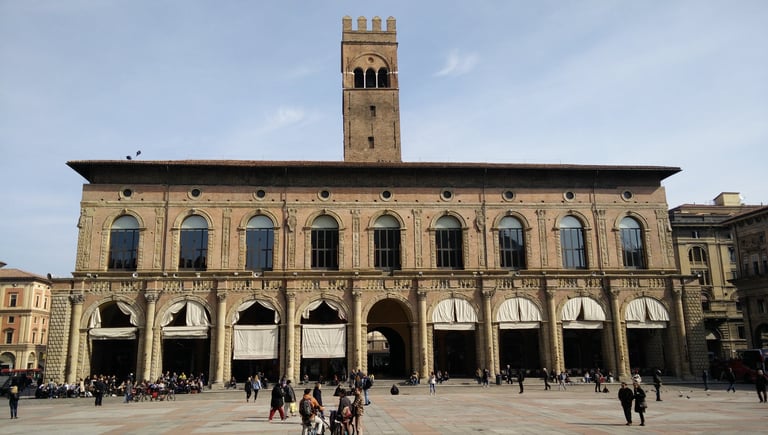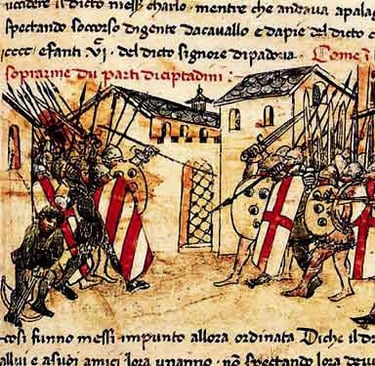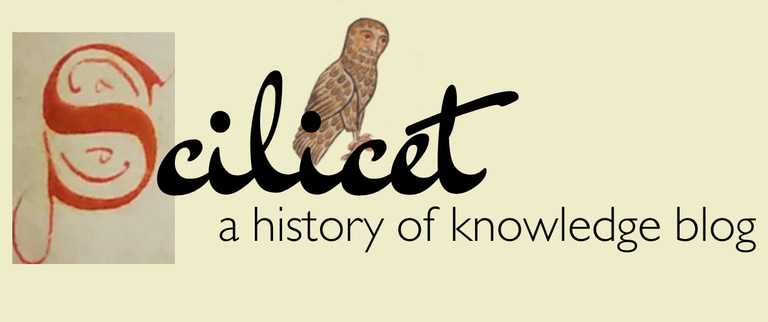Magnates were like magnets for trouble
Just like in Florence, where the nobles were excluded from political power, the Bolognese members of guilds and societies, collectively known as the popolo, experienced quite a few issues with the local magnates who were rich, powerful and violent. One of the main instruments that the political elite, (mostly) made out of Geremei members of the popolo, created to keep the magnates and Lambertazzi at bay was a compilation of ordinances approved in 1288, known as the Sacred and Most Sacred Ordinances.
The relevant bit of this legislation for our purposes of understanding corrupt elections is article no. VIII of the Sacred Ordinances, On the Election of the Anziani (De electione ancianorum). It starts with a rather bleak statement about the dismal state of affairs in regard to electing the highest legislative council. They stated that ‘very often’ (sepius) perjuries are being committed and people who are unworthy of the job get elected through dodgy deals with aspiring anziani and magnates (who were, of course, barred from these roles). The result of this, the legislators lamented, is the disgrace of the Geremei faction and the entire commune of Bologna.
Well, that all sounds very serious indeed, but we must remember that this legislation was part of a concerted effort to get rid of political rivals, so we need to take this depiction with a grain of salt. It would have been in the interest of the ruling elite to exaggerate the severity of corruption just so that they could reasonably introduce the following election procedure to make sure that no outsider ever makes it in through the cracks.
How to run a fair election
Let’s run through the process. Three days before the election, the captain of the popolo had to call the officers (ministrales) of the city guilds and get each of them to nominate, after taking a solemn oath, six of the best and most prudent and honourable men (yes, only men), aged 30 or more, with property of at least 50 lire according to the tax registry, who were loyal members of the Geremei faction, and who had lived in Bologna for at least 25 years with their families. No officers of the guilds could be nominated themselves, nor any of their immediate male relatives, nor anyone who wasn’t eligible to be admitted to a guild (which again excludes magnates).
Within three days, the capitano, having received the nominations, had to convene the voters. All members of the popolo seem to have been able to vote. Along with the voters, the capitano also had to summon eight friars from the Franciscan, Dominican, or Augustinian monastic orders (two friars for each of Bologna’s four quarters) to help administer the voting process.
Now, some of you may wonder, what’s the deal with the monks? To answer this, we need to give some consideration to the perennial question: who can you really trust? It’s hard to exaggerate the extent to which good reputation and trust were instrumental to the smooth operation of medieval societies. Within the religious culture of the Middle Ages, closeness to God often went alongside trustworthiness, and friars who lived by a regula (or ‘rule’; a set of strict standards meant to protect their piety and good character) were particularly trusted. Members of mendicant orders (originally begging monks who focused on preaching) were sought after by urban governments across medieval Italy who would often delegate to them roles in their treasury or chancery, and indeed, in the administration of elections.
After everyone assembled, each voter was called by the capitano to vote, he would then take an oath and go to the two friars appointed for counting the votes of the quarter in which he resided. One of the friars would then read out to the voter the list of six candidates put forward by the guild or society in which he was a member, and the voter would indicate his decision secretly to the friars. One of the friars would then make a mark next to the relevant name on his list.
After everyone had voted, the votes were tallied in the presence of the capitano and the incumbent anziani who scrutinised the process, and the results would later be announced in the proper way.
As part of the voting process, the capitano also had to read out the names of everyone who served as an anziano during the previous year (as anziani were not eligible to serve twice in the space of one year) as well as any relevant piece of legislation which prohibited anyone specific from being elected. Thus, it was meant to ensure that no one who was barred from standing found themselves on the ballot.
What we end up with is a hyper selective and quite restrictive process that seems to have been designed mainly to make sure that the ruling political elite never lost its hegemony (spoiler alert: it eventually did). The criteria for election are quite clearly stated in several places in this law as being the best candidate for the popolo, commune, and the Geremei faction (pro popullo Bononie et comuni Bononie et pro parte Ieremiensium). Magnates were excluded from the popolo and the Lambertazzi were excluded from the Geremei faction which leaves out quite a lot of people.
This all sounds rather orderly, unlike the events in Florence which we reviewed, but was it any fairer? That much is perhaps less conclusive. We can treat this case as an invitation to think about our own electoral systems and how fair and fit for purpose they are, what our democratic elections promise and what they actually do. For example, there has been endless debate and criticism of the UK’s first past the post system or the US’s Electoral College for not considering a large proportion of votes casted. No electoral system is perfect and knowing about constitutional arrangements from the past and the specific ways in which they were flawed can inform our thinking about our own institutions and how we might improve them. But until we manage that, you should always go out and vote if you get the chance!
Sources
Statuti di Bologna dell’anno 1288, eds., Gina Fasoli, and Pietro Sella (Vatican City, 1937), vol. I, pp. 297-99.
If you want to find out more about the roles churchmen played in urban governments, you should read:
Frances Andrews and Maria Agata Pincelli, eds., Churchmen and Urban Government in Late Medieval Italy, c. 1200–c. 1450: Cases and Contexts (Cambridge, 2013).
And on trust see:
Ian Forrest, Trustworthy Men: How Inequality and Faith Made the Medieval Church, (Princeton, NJ, 2018).




